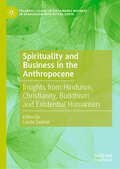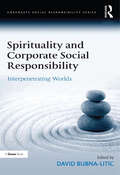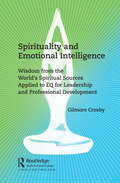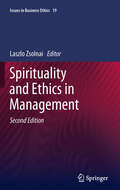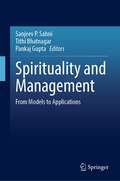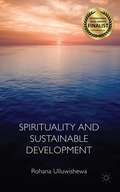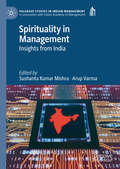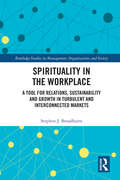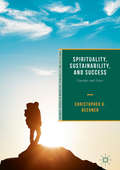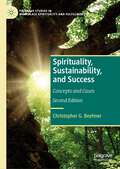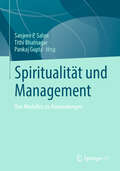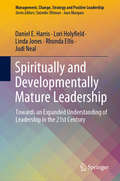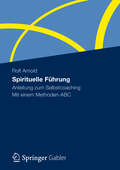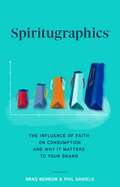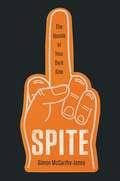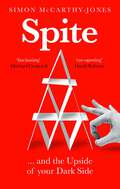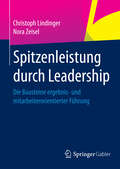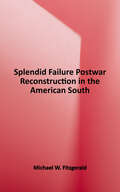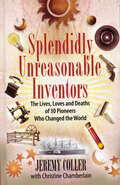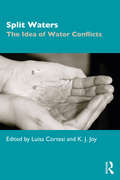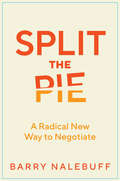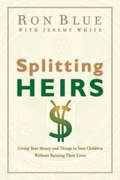- Table View
- List View
Spirituality and Business in the Anthropocene: Insights from Hinduism, Christianity, Buddhism and Existential Humanism (Palgrave Studies in Sustainable Business In Association with Future Earth)
by Laszlo ZsolnaiThis contributed volume collects innovative papers by scholars from Europe, India, and the USA to investigate how spirituality can contribute to renewing business in response to the challenges of the Anthropocene era. These challenges include climate change, biodiversity loss, ecosystems collapse, growing inequality, wellbeing deficiencies, and social unrest. Using insights from Christianity, Hinduism, Buddhism, and Existential Humanism the book explores the spiritual aspects of the present ecological, economic, social and ethical crises, materialist worldviews in the Anthropocene and their relation to crises. Further, it reinterprets personalism for embracing ecological values, presents working models of spiritually-based sustainability practices in business, and discusses the integration of spirituality into business education to foster a greater understanding of our interconnectedness with the planet and with each other. Part of the Palgrave Studies in Sustainable Business in Association with Future Earth book series, this interdisciplinary work will be of great interest to scholars and students of sustainability, spirituality in business, leadership, and many other fields.
Spirituality and Business: An Open Letter to Christian Leaders in Times of Urgency
by Philippe de WootAre the demands placed on 21st-century business leaders compatible with Christian values? Is it possible to act ethically and be socially responsible within a global system driven by economic demands? This important book explores the current conflict between spirituality and corporate leadership and asks challenging questions of business leaders and decision-makers.
Spirituality and Corporate Social Responsibility: Interpenetrating Worlds (Corporate Social Responsibility)
by David Bubna-LiticReligion and spirituality have often been treated with a secular disdain by management theorists. Recently, the tide has begun to turn and there is a growing openness to cite spirituality in academic analysis and debate, and when considering issues of practical concern to those engaged in the actual business of management. This provocative book brings together a range of leading thinkers to consider the relationship between spirituality and corporate social responsibility. The book's contributors examine spirituality as an inherent dimension of corporate life even if it is only known through its absence - and through the negative consequences of this absence on people and the planet. With contributors from four continents, David Bubna-Litic has assembled a range of fascinating perspectives having their origins in traditions that include Christianity, Process Theology, Hinduism, Contemporary Buddhism, Deep Ecology, Humanism, Post-Modern and Post-Romantic Spirituality. Spirituality and Corporate Social Responsibility is a fascinating read for anyone with an interest in ways in which spirituality relates to what is or what should be driving businesses and organizations to more responsible behaviour.
Spirituality and Emotional Intelligence: Wisdom from the World’s Spiritual Sources Applied to EQ for Leadership and Professional Development
by Gilmore CrosbyThis book weaves together spirituality and a systemic version of emotional intelligence that incorporates Kurt Lewin’s social science and other sources. Emotional intelligence calls on us to be fully present “to the moment.” It calls on us to be appreciative of ourselves and our relationships. Likewise, a calm and compassionate presence is almost universally recognized as a spiritual way of being. In other words, the overwhelming majority of the world’s spiritual sources call on us to be emotionally intelligent and that link is explored with unique clarity in this simple yet powerful text. We are all reactive at times. Becoming more objective and less attached allows us to feel our feelings without being a prisoner to acting on them in habitual ways. From a more detached perspective, feelings are neither good nor bad, but simply clues as to how we are perceiving our environment, especially our social environment. This is especially important in terms of our relationships at work. Our perceptions about what people intend trigger our emotional reactions. Think about the difference when you perceive critical feedback as a sincere attempt to help or when you perceive it as an attack of some sort. Perception evokes different emotional responses. Objectivity about our own perception is even more important than objectivity about emotion, because the former usually precedes the later. Paradoxically, being detached allows one to appreciate and experience one’s emotions more fully. Recognizing emotion as part of your inner guidance system instead of as something dangerous that must be controlled or denied is freeing. The less emotion runs you, the more you can accept feeling what you feel. Emotion is a form of physical energy. Fighting your own feelings takes energy. Allowing the ebb and flow of emotion is essential to physical and emotional health and to accepting ourselves as we are.
Spirituality and Ethics in Management
by Laszlo ZsolnaiThe book - which was originally published by Kluwer in 2004 - is a collection of scholarly papers focusing on the role of spirituality and ethics in renewing the contemporary management praxis. The basic argument is that a more inclusive, holistic and peaceful approach to management is needed if business and political leaders are to uplift the environmentally degrading and socially disintegrating world of our age. The book uses diverse value-perspectives (Hindu, Catholic, Buddhist, and Humanist) and a variety of disciplines (philosophy, ethics, management studies, psychology, and organizational sciences) to extend traditional reflections on corporate purpose and focuses on a self-referential organizational-existential search for meaning, identity and success.
Spirituality and Management: From Models to Applications
by Pankaj Gupta Sanjeev P. Sahni Tithi BhatnagarThis book discusses the importance of integrating spirituality from diverse knowledge backgrounds to be effective in its everyday use. Bringing together global experts in the field, this book provides an extensive overview of the various spirituality and management themes, models, approaches, and complexities. The chapters in the book include deliberations upon wisdom from the Bhagwat Gita; Buddha; the impact of spirituality on good governance, quality of life; integrating ethics, human values, happiness; meditation; and linking of spirituality and management and their effect on leadership, and workplace environment. A thought-provoking read for scholars, students, and policy-makers, this book provides an Indian perspective on managing spirituality at work. This book is even more relevant in the post-COVID-19 scenario as it focuses on the holistic development of people and organizations.
Spirituality and Sustainable Development
by Rohana UlluwishewaLooking beyond the materialistic boundary of the conventional development paradigm, this book identifies our spiritual underdevelopment which is being reflected as self-centeredness and greed, as the root cause of conventional development's failure to alleviate poverty and inequality, achieve sustainability and deliver happiness to humanity.
Spirituality in Management: Insights from India (Palgrave Studies in Indian Management)
by Arup Varma Sushanta Kumar MishraWith spirituality being brought to the fore of management and organisation studies, this timely collection takes a closer look at the relationship between religion and work in India. Bringing together experts from various backgrounds, this book provides a comprehensive review of the topic, addressing its key underpinnings and complexities. Spirituality in Management is divided into four sections, covering the evolution of workplace spirituality, its causes, characteristics and outcomes, and culminating in a critical analysis. A thought-provoking read for scholars, students and policy-makers, this book provides an Indian perspective on managing spirituality at work, and offers insights into successful organisational practice.
Spirituality in the Workplace: A Tool for Relations, Sustainability and Growth in Turbulent and Interconnected Markets (Routledge Studies in Management, Organizations and Society)
by Stephen J. BroadhurstAs we become more and more of a global trading world, the challenges of leading and managing within this turbulent environment and its associated, complex, interconnected markets and disconnected relationships are indisputable, so just how far can any change requirements be practically engaged with, whilst also keeping the employee at the organisation’s central core? Today’s business world cries out for people who can lead with a cross-cultural global perspective, who can lead from the heart as well as the mind and address and manage problems on not just an integrated local level, but also with a healthy, holistic perspective. The subject of spirituality has long been discussed within academic research, but there still seems to be a misunderstanding and stagnation of both its real meaning and application amongst business academics, the population and organisations alike. This book aims to provide a realistic message to help those who are looking for some answers; for those who are looking for a way to advance their own skill-set and progress both their careers and the organisation’s current standing; to move from being confused and insecure about strategies and tactics, to positively contributing to not only their own, but also to the employees’ well-being and the business’s overall purpose and intention. By basing the content upon real and relevant, interesting, modern-day perspectives, applications, requirements, opportunities and benefits, all combined into a manual for thought and a practical framework for action, this book will significantly and realistically move the subject of spirituality forward. This book will be of interest to researchers, academics and students with a special interest in the, positive, influence of spirituality within the workplace and everyday healthy living.
Spirituality, Sustainability, and Success: Concepts and Cases (Palgrave Studies in Workplace Spirituality and Fulfillment)
by Christopher G. BeehnerThis book offers a pragmatic approach to the benefits of spirituality and sustainability for both individual and organizational success. It introduces sustainability and workplace spirituality as contemporary solutions to the challenging organizational environment. The first few chapters introduce the fundamentals of spirituality, workplace spirituality, and sustainability. The author then demonstrates how the three qualities are beneficial in achieving personal and business success. Through the combination of synthesized research summaries and case studies of individuals and organizations, this book offers readers a fresh perspective on the importance of spirituality and sustainability to organizational performance.
Spirituality, Sustainability, and Success: Concepts and Cases (Palgrave Studies in Workplace Spirituality and Fulfillment)
by Christopher G. BeehnerThis book offers a pragmatic approach to the benefits of spirituality and sustainability for both individual and organizational success. It introduces sustainability and workplace spirituality as contemporary solutions to the challenging organizational environment. The first few chapters introduce the fundamentals of spirituality, workplace spirituality, and sustainability. The author then demonstrates how the three qualities are beneficial in achieving personal and business success. Through the combination of synthesized research summaries and case studies of individuals and organizations, this book offers readers a fresh perspective on the importance of spirituality and sustainability to organizational performance.
Spiritualität und Management: Von Modellen zu Anwendungen
by Pankaj Gupta Sanjeev P. Sahni Tithi BhatnagarDieses Buch erörtert die Bedeutung der Integration von Spiritualität aus vielfältigen Wissenshintergründen, um in der alltäglichen Anwendung wirksam zu sein. Indem es weltweit führende Experten auf diesem Gebiet zusammenbringt, bietet das Buch einen umfassenden Überblick über verschiedene Themen, Modelle, Ansätze und Komplexitäten von Spiritualität und Management. Die Kapitel des Buches befassen sich mit Überlegungen zur Weisheit aus der Bhagavadgita und dem Buddhismus, dem Einfluss von Spiritualität auf gute Führung, Lebensqualität, die Integration von Ethik, menschlichen Werten und Glück, Meditation sowie der Verknüpfung von Spiritualität und Management und deren Auswirkungen auf Führung und Arbeitsumgebung. Ein anregender Lesestoff für Wissenschaftler, Studierende und Entscheidungsträger, bietet dieses Buch eine indische Perspektive auf das Management von Spiritualität am Arbeitsplatz. In der post-COVID-19-Situation gewinnt das Buch noch mehr an Relevanz, da es sich auf die ganzheitliche Entwicklung von Menschen und Organisationen konzentriert.
Spiritually and Developmentally Mature Leadership: Towards an Expanded Understanding of Leadership in the 21st Century (Management, Change, Strategy and Positive Leadership)
by Linda Jones Judi Neal Daniel E. Harris Lori Holyfield Rhonda EllisThe book goes beyond theory to offer tools and suggestions for developing emerging leaders. Inspired by the pioneering work of leadership scholar Andre Delbecq, this book points towards an expanded model of leadership that incorporates an active inner life, and posits that such fully human models of leadership will be essential to meet the profound challenges of the 21st Century. Without presuming to provide definitive answers, the text explores central questions such as: What is the added value of spiritual maturity to leadership? Would the integration of mature spirituality with well-developed intellectual and emotional capacities produce more beneficial leadership outcomes for organizations and individuals? What would a spiritually and developmentally mature emerging leader look like in 10 to 20 years? How do we prepare emerging leaders for the challenges they may face; and how do we model spiritually and developmentally mature leadership in ways that resonate with them?Professor Andre Delbecq (1936-2016) of the University of Santa Clara created the heuristic of “spiritually and developmentally mature leaders” to encapsulate his observation that outstanding leaders often seemed to draw strength and wisdom from sources that are not typically studied or taught in leadership courses. Thirty scholars and practitioners accepted Delbecq’s heuristic as the starting point to explore spiritual components of leadership that do not easily lend themselves to quantification or clear causal links. The analysis of their disciplined engagement with the heuristic forms the foundation of an exploratory, fully human understanding of leadership. This analysis is supported by literature reviews, including an overview of Andre Delbecq’s relevant work. Ultimately, the authors call for further collaboration across disciplines and between research and practice to build on the conceptual constructs offered here, and, especially, to create pedagogies for the training of spiritually and developmentally mature leaders
Spirituelle Führung
by Rolf ArnoldIn einem fiktiven Briefwechsel zwischen der Führungskraft Bernhard und ihrem akademischen Coach Karl vermittlet dieses Buch grundlegende Erkenntnisse über das Spirituelle der Führung. Berhard sucht nach den tieferen Spuren seines Leitungshandelns und fragt nach einer sinnvollen, "guten" und wirksamen Praxis des Umgangs mit sich selbst und anderen im Führungsalltag. Karl antwortet aus einer philosophisch sowie führungstheoretisch tief begründeten Perspektive heraus, und es entspannt sich ein sehr persönlicher, aber auch grundsätzlicher Dialog über das Spirituelle der Führung. Beide entwickeln dabei sehr konkrete Vorschläge, Vorgehensweisen und Instrumente - so wie in dem Buch "Führen mit Gefühl" (2. Auflage Gabler 2011) desselben Autors.
Spirituelle Führung: Anleitung zum Selbstcoaching Mit einem Methoden-ABC
by Rolf ArnoldIn einem fiktiven Briefwechsel zwischen der Führungskraft Bernhard und ihrem akademischen Coach Karl vermittlet dieses Buch grundlegende Erkenntnisse über das Spirituelle der Führung. Berhard sucht nach den tieferen Spuren seines Leitungshandelns und fragt nach einer sinnvollen, „guten“ und wirksamen Praxis des Umgangs mit sich selbst und anderen im Führungsalltag. Karl antwortet aus einer philosophisch sowie führungstheoretisch tief begründeten Perspektive heraus, und es entspannt sich ein sehr persönlicher, aber auch grundsätzlicher Dialog über das Spirituelle der Führung. Beide entwickeln dabei sehr konkrete Vorschläge, Vorgehensweisen und Instrumente – so wie in dem Buch „Führen mit Gefühl“ (2. Auflage Gabler 2011) desselben Autors.
Spiritugraphics: The Influence of Faith on Consumption and Why It Matters to Your Brand
by Brad Benbow Phil DanielsIn Spiritugraphics, authors Brad Benbow and Phil Daniels explore, through research and case studies on some of the top brands and companies, the question of whether or not faith influences consumption and to what extent it influences our day-to-day purchasing decisions with the goal of helping companies reach this deeply connected segment of the marketplace. Does a person&’s faith affect what they buy and don&’t buy? What about where they make their purchases? Are consumers shopping differently today versus three to five years ago? These and other key questions were posed to women of all age groups in a national behavioral study executed by America&’s Research Group between December 2020 and January 2021. In Brad Benbow and Phil Daniels&’ groundbreaking book, Spiritugraphics: The Influence of Faith on Consumption and Why It Matters to Your Brand, you will discover keen insights into topics important to marketers like: How much does &“Made in America&” affect shoppers of faith? In spite of current culture change, political correctness and consequences of expressing diverse thought, 42.4% of female Christians in the US say that &“American-made&” is very important. Does &“holiday&” vs. &“Christmas&” really matter to people of faith? According to the research, 60% stated that any retailer promoting &“Christmas&” rather than &“Holiday&” (or other references) had a significant advantage with them compared to their competitors. Marketers and brand managers have long operated under the framework of demographics, psychographics, and sociographics. Authors Benbow and Daniels present a new set of data points to be considered: Spiritugraphics. Ultimately the book provides ten key &“Spiritugraphics&” that you and your company/brand should pay close attention to if you want to reach this highly engaged and deeply connected segment of the marketplace.
Spite: The Upside of Your Dark Side
by Simon McCarthy-JonesSpite angers and enrages us, but it also keeps us honest. In this provocative account, a psychologist examines how petty vengeance explains human thriving. Spite seems utterly useless. You don't gain anything by hurting yourself just so you can hurt someone else. So why hasn't evolution weeded out all the spiteful people? <P><P> As psychologist Simon McCarthy-Jones argues, spite seems pointless because we're looking at it wrong. Spite isn't just what we feel when a car cuts us off or when a partner cheats. It's what we feel when we want to punish a bad act simply because it was bad. Spite is our fairness instinct, an innate resistance to exploitation, and it is one of the building blocks of human civilization. <P><P>As McCarthy-Jones explains, some of history's most important developments—the rise of religions, governments, and even moral codes—were actually redirections of spiteful impulses. A provocative, engaging read, Spite shows that if you really want to understand what makes us human, you can't just look at noble ideas like altruism and cooperation. You need to understand our darker impulses as well.
Spite: and the Upside of Your Dark Side
by Simon McCarthy-JonesHave you ever done something stupid, dangerous or self-sabotaging just to get one over someone else? Most of us have. Simon McCarthy-Jones draws on psychology, current affairs, literature and genetics to illuminate – whether we admit it or not – our spiteful side. What is that part of us that secretly wants our friends to fail? Did Americans put Trump in the White House just to stick it to Hillary Clinton? And then there are the legion of stories about toxic behaviour in supermarkets and over the privet hedge, ramping up to incendiary divorces, vicious business practices, backbiting politics and scorched-earth terrorism. There&’s a hopeful message too – the upside of our dark side. Spite can drive us forward, and Simon provides a fresh perspective on the concept by showing the evolutionary benefits of spite as a social leveller, an enabler of defiance, a wellspring of freedom and a vital weapon in our everyday armoury.
Spitzenleistung durch Leadership: Die Bausteine ergebnis- und mitarbeiterorientierter Führung
by Christoph Lindinger Nora ZeiselIn den Wirtschaftsnachrichten häufen sich die Skandale: von Abzockern, Missmanagement und einem Verlust an Menschlichkeit ist die Rede. Zugleich wachsen mit dem Ruf nach besserer Führung die Herausforderungen an das Management: Schnelligkeit, Ideenreichtum und Leidenschaft - all dies und vieles mehr wird zunehmend gefordert. Lässt sich das eine vermeiden und das andere stärken? "Spitzenleistung durch Leadership" hat alle Aspekte der Führung im Fokus und beschreibt eine Führungsphilosophie, die den Menschen, das Team und die Organisation in den Vordergrund rückt. Die Autoren stellen das Thema Leadership als ganzheitlichen Ansatz dar und identifizieren vier Felder, in denen Leadership wirksam wird: Führungskräfte, Mitarbeiter, Prozesse sowie Markt und Kunden. Anhand vieler praktischer Beispiele wird deutlich, wie es gelingt, Unternehmenserfolg und Menschenentwicklung gleichermaßen in den Mittelpunkt zu stellen und Wertsteigerung durch Wertschätzung zu erreichen. Ein Grundlagenwerk und Arbeitsbuch für Führungskräfte aller Branchen und Hierarchie-Ebenen, die Leadership-Qualitäten aufbauen wollen - mit zahlreichen Umsetzungstipps.
Splendid Failure: Postwar Reconstruction in the American South (American Ways Ser.)
by Michael W. FitzgeraldSince the civil rights era of the 1960s, revisionist historians have been sympathetic to the racial justice motivations of the Radical Republican Reconstruction policies that followed the Civil War. But this emphasis on positive goals and accomplishments has obscured the role of the Republicans in the overthrow of their own program. Rich with insight, Michael W. Fitzgerald's new interpretation of Reconstruction shows how the internal dynamics of this first freedom movement played into the hands of white racist reactionaries in the South. Splendid Failure recounts how postwar financial missteps and other governance problems quickly soured idealistic Northerners on the practical consequences of the Radical Republican plan, and set the stage for the explosion that swept Southern Republicans from power and resulted in Northern acquiescence to the bloody repression of voting rights. The failed strategy offers a chastening example to present-day proponents of racial equality.
Splendidly Unreasonable Inventors: The Lives, Loves, and Deaths of 30 Pioneers Who Changed the World
by Jeremy Coller Christine ChamberlainWhy do some inventors succeed and others fail? A private equity pioneer explores personal traits and processes that worked for thirty innovators—or didn’t.Jeremy Coller, a pioneer in the world of private equity, argues that there are three basic personality types in the arena of invention. The Principal, Broker, and Consultant each display certain traits that dictate the potential for success, but few people have the full package. Failure results when an individual who excels in one area of competence attempts to become all things. Thus, even accomplished geniuses can end up penniless.In Splendidly Unreasonable Inventors, Coller focuses on the individual rather than the invention—and explores the ways in which he or she did or did not succeed in bringing their vision to fruition. On one level, the book is a collection of fascinating stories packed with quirky, often humorous nuggets of information. On another level, these stories provide an unconventional look at the processes and personalities that created products that changed the world, including: Jonas Salk and the polio vaccineKing Gillette and the safety razorAlfred Nobel and dynamiteSam Colt and the revolverRudolph Diesel and the diesel engine, and more
Split Waters: The Idea of Water Conflicts
by K. J. Joy Luisa CortesiLimited, finite, contaminated, unavailable or expensive, water divides people all around the globe. We all cannot do without water for long, but can for long enough to fight for it. This commonsensical narration of water conflicts, however, follows a pattern of scarcity and necessity that is remarkably unvaried despite different social and geographical contexts. Through in-depth case studies from around the globe, this volume investigates this similarity of narration—confronting the power of a single story by taking it seriously instead of dismissing it. In so doing, it invites the reader to rethink water conflicts and how they are commonly understood and managed. This book: Posits the existence of the idea of water conflict, and asks what it is and what it produces, thus how it is used to pursue particular interests and to legitimise specific historical, technological and environmental relations; Examines the meaning and power of ideas as compared to other categories of knowledge, advancing theoretical frameworks related to environmental knowledge, discursive power, social constructivism; Presents an alternative agenda to deepen the conversation around water conflicts among scholars and activists. Of interest to scholars and activists alike, this volume is addressed to those involved with environmental conflicts, environmental knowledge and justice, disasters and climate change from the disciplinary angles of environmental anthropology and sociology, political ecology and economy, science and technology studies, human geography and environmental sciences, development and cooperation, public policy and peace studies. Essays by Gina Bloodworth, Ben Bowles, Patrick Bresnihan, Luisa Cortesi, Mattia Grandi, K. J. Joy, Midori Kawabe, Adrianne Kroepsch, Vera Lazzaretti, Leslie Mabon, Renata Moreno Quintero, Madhu Ramnath, Jayaprakash Rao Polsani, Dik Roth, Theresa Selfa,Veronica Strang, Mieke van Hemert, Jeroen Warner, Madelinde Winnubst.
Split the Pie: A Radical New Way to Negotiate
by Barry NalebuffFrom a leading Yale expert and serial entrepreneur, a radical, principled, and field-tested approach that identifies what’s really at stake in any negotiation and ensures you get your half—so you can focus on growing the pie. Negotiations are incredibly stressful and can bring out the worst in people. Wouldn’t it be better if there were a principled way to negotiate? Wouldn’t it be even better if there were a way to treat people fairly and get treated fairly in a negotiation?Split the Pie offers a new approach that does both—a field-tested method that reframes how negotiations play out. Barry Nalebuff, a professor at Yale School of Management, helps identify what’s really at stake in a negotiation: the “pie.” The negotiation pie is the additional value created through an agreement to work together. Seeing the relevant pie will change how you think about fairness and power in negotiation. You’ll learn how to get half the value you create, no matter your size. Filled with examples and in-depth case studies, Split the Pie is a practical and theory-based approach to negotiation. You’ll see how it helped reframe a high-stakes negotiation when Coca-Cola purchased Honest Tea, a company Barry cofounded with his former student Seth Goldman. The pie framework also works for everyday negotiations. You’ll learn how to deploy logic to determine truly equitable solutions and employ empathy to expand the pie and sell your solution. Split the Pie allows both sides to focus their energy on making the biggest possible pie—to have your pie and eat it too.
Splitting Heirs: Giving Your Money and Things to Your Children Without Ruining Their Lives
by Ron BlueFinish well. That is what we are called to do in Scripture, but where will our money and possessions finish? The Bible has the principles that provide answers to the challenge of parenting and passing along an in heritage. Within the next decade, over ONE TRILLION DOLLARS will change hands from one generation to the next. Individuals with adult children will need to transfer that wealth without ruining their heirs' lives. Ron Blue, an authority on personal and business finance, will help:~Identify exactly how much money would be transferred were the reader to die today~Identify the need for creating a will~Identify tax-wise financial planning~Teach the way to leave money without creating an unhealthy dependence
Splitting Heirs: Giving Your Money and Things to Your Children Without Ruining Their Lives
by Ron BlueFinish well. That is what we are called to do in Scripture, but where will our money and possessions finish? The Bible has the principles that provide answers to the challenge of parenting and passing along an in heritage. Within the next decade, over ONE TRILLION DOLLARS will change hands from one generation to the next. Individuals with adult children will need to transfer that wealth without ruining their heirs' lives. Ron Blue, an authority on personal and business finance, will help:~Identify exactly how much money would be transferred were the reader to die today~Identify the need for creating a will~Identify tax-wise financial planning~Teach the way to leave money without creating an unhealthy dependence
